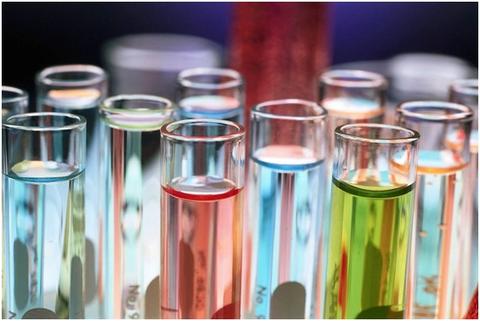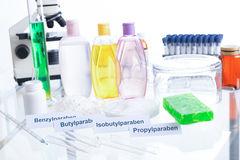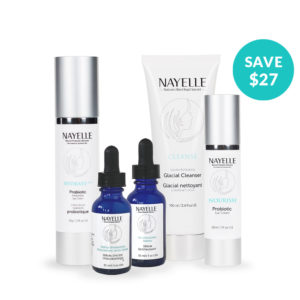
The beauty industry has an ugly secret.
Your makeup, face cream, skin moisturizer, or cleanser may deliver short term smoothness and brightness, but it may disrupt your hormones and fertility, expose you to known cancer-causing pesticides, and deliver dangerous toxins that penetrate and age your skin. That’s right. The cosmetics you use may actually speed the formation of wrinkles, age spots, and worse.
In the US, researchers have found 1 of every 8 ingredients used in cosmetics is an industrial chemical. Many of these were originally created to keep concrete soft, remove grease from auto parts, and as surfactants paints and inks.
To help you identify which is good and which is not, here’s a list of chemicals that you should avoid.
- Urea
Examples: diazolindyl urea, imidazolindyl urea
Common preservatives that release formaldehyde, a known carcinogen, that is irritating to the mucous membranes and known to cause contact dermatitis, headaches and internal bleeding.
- Parabens
Examples: butylparaben, ethaylparaben, isobutylparaben, isopropylparaben, methylparaben, propylparaben
You’ve probably seen a slew of products marketing themselves as “paraben-free”. These chemicals mimic estrogen and lead to hormone imbalance. Now, reports suggest their presence in every American’s body. Whether they are or aren’t, avoid products with parabens to prevent reproductive problems like infertility or slowed growth and developmental disorders in children.
Common preservatives that are linked to breast cancer.
- Phthalates
Examples: di-butyl-phthalate, di-ethylhexyl-phthalate.
A common ingredient in “fragrances”, phthalates block testosterone and damage a man’s reproductive system. These dangerous chemicals have also been linked to an increased risk of breast cancer. Commonly used as a plasticizer in everything from skincare, cosmetics, nail polish, perfume to hair products and deodorants. Known to cause damage to the liver, kidneys, lungs and reproductive system. Suspected of causing birth defects, lowering sperm counts and a breast cancer risk.
- Petroleum By-Products
Examples: mineral oil, petrolatum, paraffin, dipropylene, glycol, butylene glycol, disodium EDTA, tetrasodium EDTA, trisodium EDTA, polybutene, triclosan, polyethylene.
Petroleum by-products interfere with the skin’s natural functions, clog the pores, exacerbates acne, and are highly likely to be contaminated with carcinogens that are linked to breast cancer.
- Propylene Glycol and Polyethylene Glycol (PEG)
Made from the same chemical that is used to create anti-freeze, this chemical easily penetrates the skin and is linked to damage of the liver, kidneys and brain.
These go by many names like Propylene glycol, polyethylene glycols, or polyoxyethylene as they are petroleum-based compounds. But they go by other names too; If you see a word with “–eth” or “–oxynol” in it, it’s likely one of these PEGs. These chemicals can be contaminated with 1,4-dioxane, a chemical the FDA says may cause cancer.

- Sodium Laurel/Laureth Sulfate
Commonly used foaming agent that is considered a skin irritant and carcinogen, and is known to cause skin rashes and allergic reactions. SLS is absorbed into the body via skin application and mimics the activity of estrogen. This has a variety of health implications ranging from PMS, decreased fertility in men as well as an increase in cancers such as breast cancer in women. It is often disguised in “natural” products with the term “derived from coconut”. It is particularly irritating to the eyes. SLS is often contaminated with dioxane, a known carcinogen and ethylene oxide, a chemical known to harm your nervous system. You’ll find this one in most shampoos, soaps, and cleansers.
- Diethanolamine (DEA) and Triethanolamine (TEA)
These chemicals can react with other ingredients in the cosmetic product to form potent carcinogenic chemicals called nitrosamines, that are linked with liver, stomach, bladder and esophagus cancers.
- Formaldehyde
Commonly found in nail products, this chemical is a known carcinogen, allergen and irritant. Commonly used synthetic preservatives, such as diazolindyl and imidazolindyl urea, break down to release formaldehyde. Another known cancer causing agent, formaldehyde also harms the brain, interferes with growth and development in children, and induces asthma. These preservatives slowly release formaldehyde to keep the skin care product from spoiling. These often trigger allergic reactions on the skin. If you’ve ever experienced a contact allergy after using a skin lotion, it probably had one of these ingredients: DMDM Hydantoin (very common), diazolidinyl urea, imidazolidinyl urea, methenamine, and quaternium-15.
- Synthetic Fragrances
parfum, vanilla, butyl ether
The simple term “fragrance” on an ingredient list can refer to a combination of any of the thousand separate ingredients used to make up the “fragrance”, many of which are phthalates (ex. toxic carcinogens and hormone disruptors) these terms indicate a mixture of ingredients that cosmetic companies don’t have to legally tell you about. Three thousand or more chemicals may be used to create a fragrance. Some “Unscented” products contain fragrances with masking agents. Fragrances are considered to be one of the top 5 known allergens and are known to cause asthma and trigger asthma attacks. Some fragrances have been linked to allergic reactions, asthma, and breathing difficulties while others have links to cancers.
Question is, how will you keep your skin looking good and healthy and how will you avoid these harmful ingredients at the same time?
Answer is, use an all organic product. Skin care products which are all natural. Cosmetics and Skin care products which are produced naturally are the best in the market and best for our skin at the same time. It makes our skin beautiful and healthy without having to suffer with any of the side effects. It is better to be able to maintain your beauty and health at the same time and it’s better to use an all-natural product so you won’t worry thinking whether it is safe or not.
NAYELLE is the best in the market right now especially for organic skin care. Not just it offers holistic results but also you will be worry free with its wide selection of cosmetics and skin care products, from masks to moisturizers. Keep your skin looking healthy and beautiful inside and out. There is no other beauty than natural beauty.

